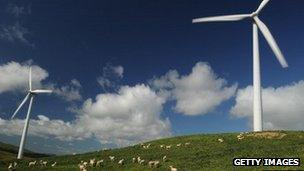Wind farm projects prompt transport concern for Powys firms
- Published

Unease is growing that mid Wales will have to endure more than its fair share of developments
Fears of transport gridlock in Powys due to wind farm development have been aired at a meeting in Newtown.
About 50 people from local firms attended with some raising concerns about the impact of building up to 15 wind farms in mid Wales.
Wind energy developers say any increase in lorries or large abnormal loads would be short lived, only happening during the construction phase.
Businesses say any disruption could affect local trade and tourism.
According to transport reports to Powys council, if all the wind farms and turbines are built it could mean over 4,000 large loads carrying equipment and components for the wind farms over a period of up to seven years.
Trevor Wheatley, of medical products firm CellPath, says it could hit the business, with around a quarter of its output being exported.
'Major disruption'
"We ship out many shipments a day and if hospitals don't get those supplies, it could be serious, especially if there's a major disruption to traffic," he said.
"They depend on the company for these specialised supplies, and we supply most hospitals in the UK."
Another local businessman, Richard Bonfield, said the "sheer scale" of the operation could hit businesses such as manufacturing and haulage as well as local tourism.
Mr Bonfield said the issue of possible opportunities for local firms had not been raised at the meeting.
"They are very concerned about the impact of five to seven years of abnormal loads and traffic delays on the mid Wales roads which are not capable of taking these loads," he said.
Wind farms are being planned as part of the UK and Welsh governments' push to produce more electricity from less polluting sources, and reduce the use of coal, oil and gas.
Llywelyn Rhys, head of renewable energy trade association RenewableUK Cymru, said any disruption would be short term, adding there could be opportunities for local businesses.
"I think it's a great opportunity for local companies and also local entrepreneurs to think very hard how they can give service to the development of wind farms in their local area," he said.
"Building new wind farms will obviously involve new construction jobs, but also it will involve a constant supply of materials to that wind farm, and after the wind farm is up and running it will obviously involve maintenance and management of that wind farm.
Power lines
Behind the call for Wednesday's meeting was the growing unease in some quarters that parts of mid Wales, especially Montgomeryshire, will have to endure more than its fair share of wind farm developments.
If all 15 wind farms are given the green light by Powys County Council and the Welsh government - and the large schemes over 50 megawatts by the UK government - hundreds of new turbines would join those already installed on the hills.
If all, or some, of these wind farms are to be erected, the National Grid would then be legally obliged to extend the electricity infrastructure, so that the power generated by the turbines could be carried to where the power is most needed - cities in England.
The National Grid is already consulting on where to place new power lines and an electricity substation in north Powys and large pylons to carry the bigger 400,000 volt power lines towards the main grid near Shrewsbury.
Underpinning the move towards renewable energy sites in Wales is an advisory document called TAN 8 - Technical Advice Note number 8; planning for renewable energy - introduced in 2005 by the Welsh Assembly Government to set up seven areas where wind turbines could be built. Three areas are in mid Wales and two in Powys.
Fossil fuels
Campaigners against the National Grid's pylons, and increasingly against wind farms, blame this policy for the current frustration in mid Wales over traffic issues and the possible effect on the landscape.
There is also anger that turbines may be forced upon them, either by the UK government's department of energy, or by local planning officers.
Mr Rhys argues, as would many politicians of all political parties, that Wales and Britain has to rely less on fossil fuels to keep the lights on, and turn to renewable energy.
The current argument is that wind energy is the most mature technology, ahead of tidal, solar and biomass.
But apart from the aesthetic argument, critics of wind energy point to the arguable efficiency of turbines, and the fact power can only be relied upon intermittently.
- Published12 January 2012
- Published9 January 2012
- Published29 June 2011
- Published10 May 2011
- Published5 May 2011
- Published3 May 2011
- Published21 April 2011
- Published16 April 2011
- Published11 April 2011